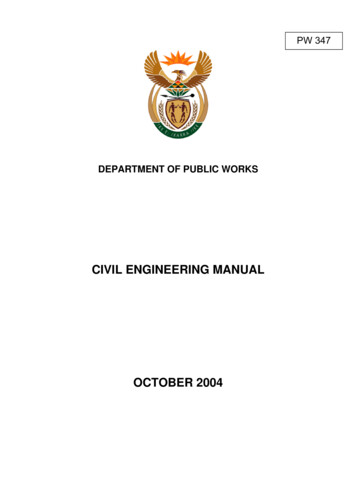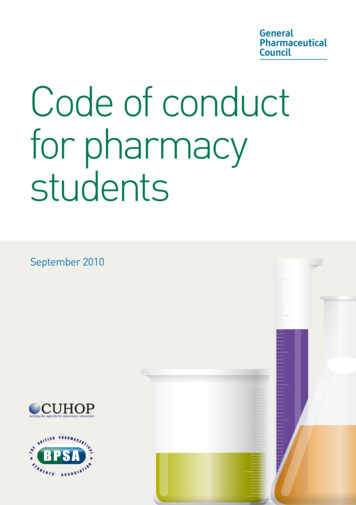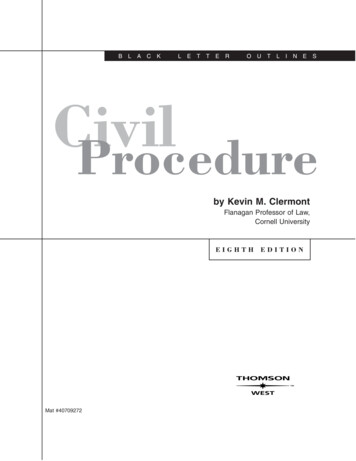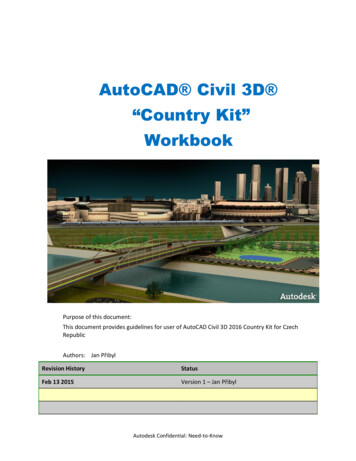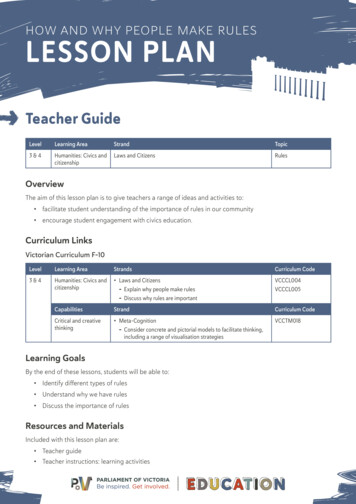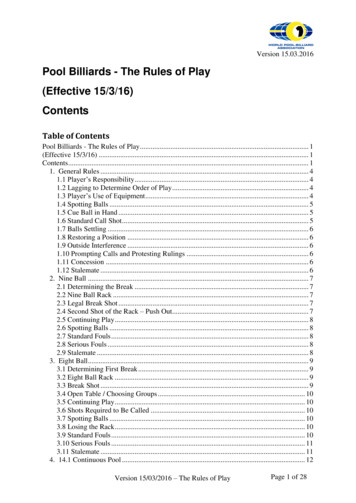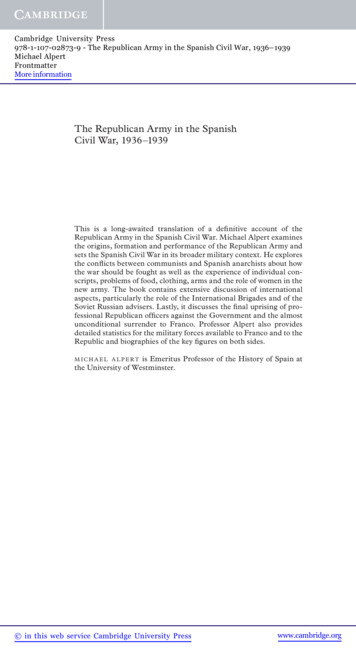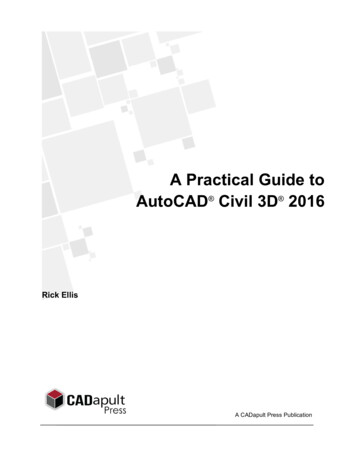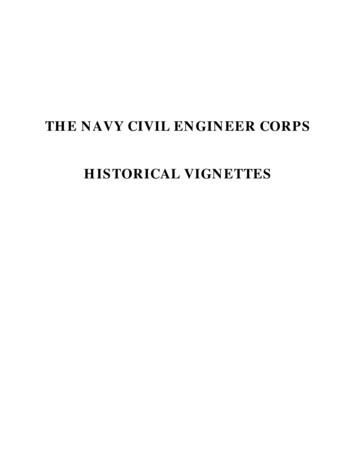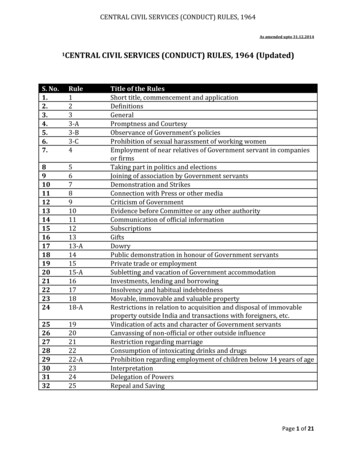
Transcription
CENTRAL CIVIL SERVICES (CONDUCT) RULES, 1964As amended upto 31.12.20141CENTRALS. A25262728293031321920212222-A232425CIVIL SERVICES (CONDUCT) RULES, 1964 (Updated)Title of the RulesShort title, commencement and applicationDefinitionsGeneralPromptness and CourtesyObservance of Government’s policiesProhibition of sexual harassment of working womenEmployment of near relatives of Government servant in companiesor firmsTaking part in politics and electionsJoining of association by Government servantsDemonstration and StrikesConnection with Press or other mediaCriticism of GovernmentEvidence before Committee or any other authorityCommunication of official informationSubscriptionsGiftsDowryPublic demonstration in honour of Government servantsPrivate trade or employmentSubletting and vacation of Government accommodationInvestments, lending and borrowingInsolvency and habitual indebtednessMovable, immovable and valuable propertyRestrictions in relation to acquisition and disposal of immovableproperty outside India and transactions with foreigners, etc.Vindication of acts and character of Government servantsCanvassing of non-official or other outside influenceRestriction regarding marriageConsumption of intoxicating drinks and drugsProhibition regarding employment of children below 14 years of ageInterpretationDelegation of PowersRepeal and SavingPage 1 of 21
CENTRAL CIVIL SERVICES (CONDUCT) RULES, 19641.Short title, commencement and application(1) These rules may be called the Central Civil Services (Conduct) Rules, 1964.(2) They shall come into force at once.(3) Save as otherwise provided in these rules and subject to the provisions of the IndianForeign Service (Conduct and Discipline) Rules, 1961, these rules shall apply to everyperson appointed to a civil service or post (including a civilian in Defence Service) inconnection with the affairs of the Union:Provided that nothing in these rules shall apply to any Government servant who is –(a) (i) a railway servant as defined in Section 3 of the Indian Railways Act, 1890 (9 of1890);(ii) a person holding a post in the Railway Board and is subject to the Railway Services(Conduct) Rules;(iii) holding any post under the administrative control of the Railway Board or of theFinancial Commissioner of Railways;(b) a member of an All India Service;(c) a holder of any post in respect of which the President has, by a general or special order,directed that these rules shall not apply:Provided further that Rules 4,6,7,12,14, sub-rule (3) of Rule 15, Rule 16, sub-rules (1), (2) and (3) ofRule 18, Rules 19, 20 and 21 shall not apply to any Government servant who draws a pay whichdoes not exceed Rs.500 per mensem and holds a non-gazetted post in any of the followingestablishments, owned or managed by the Government, namely:(i)(ii)(iii)(iv)(v)(vi)(vii)ports, docks, wharves or jetties;defence installations except training establishments;public works establishments, in so far as they relate to work-charged staff;irrigation and electric power establishments;mines as defined in clause (j) of Section 2 of the Mines Act, 1952 (35 of 1952);factories as defined in clause (m) of Section 2 of the Factories Act, 1948 (63 of 1948);andfield units of the Central Tractor Organisation employing workmen governed bylabour laws:Provided further that these rules shall apply to any person temporarily transferred to a service orpost specified in clause (a) of the first proviso to whom but for such transfer these rules would haveotherwise applied.EXPLANATION- For the purposes of the second proviso, the expression 'establishment' shallnot include any railway establishment or any office mainly concerned with administrative,managerial, supervisory, security or welfare functions.Page 2 of 21
CENTRAL CIVIL SERVICES (CONDUCT) RULES, 19642.DefinitionsIn these rules, unless the context otherwise requires,(a) "The Government" means the Central Government;(b) "Government servant" means any person appointed by Government to any civil serviceor post in connection with the affairs of the Union and includes a civilian in a DefenceService;EXPLANATION.–A Government servant whose services are placed at the disposal of a company,corporation, organisation or a local authority by the Government shall, for the purpose of theserules, be deemed to be a Government servant serving under the Government notwithstanding thathis salary is drawn from sources other than the Consolidated Fund of India;(c) "Members of family" in relation to a Government servant includes:(i) the wife or husband as the case may be, of the Government servant, whetherresiding with the Government servant or not but does not include a wife orhusband, as the case may be, separated from the Government servant by a decreeor order of a competent Court;(ii) son or daughter or step-son or step-daughter of the Government servant andwholly dependent on him, but does not include a child or step-child who is nolonger in any way dependent on the Government servant or of whose custody theGovernment servant has been deprived by or under any law;(iii) any other person related, whether by blood or marriage to the Government servantor to the Government servant's wife or husband, and wholly dependent on theGovernment servant.3. General(1) Every Government servant shall at all times-(i)(ii)(iii)44(IV)maintain absolute integrity;maintain devotion to duty; anddo nothing which is unbecoming of a Government servant.commit himself to and uphold the supremacy of the Constitution and democraticvalues;(v) defend and uphold the sovereignty and integrity of India, the security of the State,public order, decency and morality;(vi) maintain high ethical standards and honesty;(vii) maintain political neutrality;(viii) promote the principles of merit, fairness and impartiality in the discharge of duties;(ix) maintain accountability and transparency;(x)maintain responsiveness to the public, particularly to the weaker section;(xi) maintain courtesy and good behaviour with the public;(xii) take decisions solely in public interest and use or cause to use public resourcesefficiently, effectively and economically;Page 3 of 21
CENTRAL CIVIL SERVICES (CONDUCT) RULES, 1964(xiii)declare any private interests relating to his public duties and take steps to resolveany conflicts in a way that protects the public interest;(xiv) not place himself under any financial or other obligations to any individual ororganisation which may influence him in the performance of his official duties;(xv) not misuse his position as civil servant and not take decisions in order to derivefinancial or material benefits for himself, his family or his friends;(xvi) make choices, take decisions and make recommendations on merit alone;(xvii) act with fairness and impartiality and not discriminate against anyone, particularlythe poor and the under-privileged sections of society;(xviii) refrain from doing anything which is or may be contrary to any law, rules,regulations and established practices;(xix) maintain discipline in the discharge of his duties and be liable to implement thelawful orders duly communicated to him;(xx) maintain confidentiality in the performance of his official duties as required by anylaws for the time being in force, particularly with regard to information, disclosure ofwhich may prejudicially affect the sovereignty and integrity of India, the security ofthe State, strategic, scientific or economic interests of the State, friendly relation withforeign countries or lead to incitement of an offence or illegal or unlawful gain to anyperson;(xxi) perform and discharge his duties with the highest degree of professionalism anddedication to the best of his abilities.(2) (i) Every Government servant holding a supervisory post shall take all possible steps toensure the integrity and devotion to duty of all Government servants for the timebeing under his control and authority;23(ii)No Government servant shall, in the performance of his official duties, or in theexercise of powers conferred on him, act otherwise than in his best judgementexcept when he is acting under the direction of his official superior;(iii) The direction of the official superior shall ordinarily be in writing. Oral direction tosubordinates shall be avoided, as far as possible. Where the issue of oral directionbecomes unavoidable, the official superior shall confirm it in writing immediatelythereafter;(iv) A Government servant who has received oral direction from his official superiorshall seek confirmation of the same in writing as early as possible, whereupon itshall be the duty of the official superior to confirm the direction in writing.26ExplanationI.- A Government servant who habitually fails to perform the task assigned to himwithin the time set for the purpose and with the quality of performance expected to him shall bedeemed to be lacking in devotion to duty within the meaning the cause (ii) of sub-rule (1).Explanation II.- Nothing in clause (ii) of sub-rule (2) shall be construed as empowering aGovernment servant to evade his responsibilities by seeking instructions from, or approval of, asuperior officer or authority when such instructions are not necessary under the scheme ofdistribution of powers and responsibilities.Page 4 of 21
CENTRAL CIVIL SERVICES (CONDUCT) RULES, 1964343A.Promptness and CourtesyNo Government servant shall(a) in the performance of his official duties, act in a discourteous manner;(b) in his official dealings with the public or otherwise adopt dilatory tactics or wilfully causedelays in disposal of the work assigned to him.343B.Observance of Government's policiesEvery Government servant shall, at all times(i) act in accordance with the Government's policies regarding age of marriage, preservationof environment, protection of wildlife and cultural heritage;(ii) observe the Government's policies regarding prevention of crime against women.36/433C.Prohibition of sexual harassment of working women(1) No Government servant shall indulge in any act of sexual harassment of any woman at any workplace.(2) Every Government servant who is incharge of a work place shall take appropriate steps toprevent sexual harassment to any woman at the work place.Explanation. - (I)For the purpose of this rule, (a) "sexual harassment" includes any one or more of the following acts or behaviour (whetherdirectly or by implication) namely : (i)physical contact and advances; or(ii) a demand or request for sexual favours; or(iii) making sexually coloured remarks; or(iv) showing pornography; or(i) any other unwelcome physical, verbal, non-verbal conduct of a sexual nature.(b) the following circumstances, among other circumstances, if it occurs or is present inrelation to or connected with any act or behaviour of sexual harassment may amount tosexual harassment : (i)implied or explicit promise of preferential treatment in employment; or(ii)implied or explicit threat of detrimental treatment in employment; or(iii) implied or explicit threat about her present or future employment status; or(iv) interference with her work or creating an intimidating or offensive or hostile workenvironment for her; or(v)humiliating treatment likely to affect her health or safety.(c) "workplace" includes,(i) any department, organisation, undertaking, establishment, enterprise, institution,office, branch or unit which is established, owned, controlled or wholly orsubstantially financed by funds provided directly or indirectly by the CentralGovernment;(ii) hospitals or nursing homes;Page 5 of 21
CENTRAL CIVIL SERVICES (CONDUCT) RULES, 1964(iii) any sports institute, stadium, sports complex or competition or games venue,whether residential or not used for training, sports or other activities relatingthereto;(iv) any place visited by the employee arising out of or during the course ofemployment including transportation provided by the employer for undertakingsuch journey;(v) a dwelling place or a house.’.4. 17Employment of near relatives of Government servant in Companies or firms(1)No Government servant shall use his position or influence directly or indirectly to secureemployment for any member of his family in any 16company or firm;(2) (i)No Class I Officer shall, except with the previous sanction of the Government, permit hisson, daughter or other dependant, to accept employment in any 16company or firm withwhich he has official dealings or in any other 16company or firm having official dealingswith the Government:Provided that where the acceptance of the employment cannot await prior permission of theGovernment or is otherwise considered urgent, the matter shall be reported to the Government;and the employment may be accepted provisionally subject to the permission of the Government.(ii) A Government servant shall, as soon as he becomes aware of the acceptance by a memberof his family of an employment in any 16company or firm, intimate such acceptance to theprescribed authority and shall also intimate whether he has or has had any officialdealings with that 16company or firm:Provided that no such intimation shall be necessary in the case of a Class I officer if he has alreadyobtained the sanction of, or sent a report to the Government under clause (i).(3)No Government servant shall in the discharge of his official duties deal with any matter orgive or sanction any contract to any 16company or firm or any other person if any memberof his family is employed in that 16company or firm or under that person or if he or anymember of his family is interested in such matter or contract in any other manner and theGovernment servant shall refer every such matter or contract to his official superior and thematter or contract shall thereafter be disposed of according to the instructions of theauthority to whom the reference is made.5. Taking part in politics and elections(1) No Government servant shall be a member of, or be otherwise associated with, any politicalparty or any organisation which takes part in politics nor shall he take part in, subscribe in aidof, or assist in any other manner, any political movement or activity.(2) It shall be the duty of every Government servant to endeavour to prevent any member of hisfamily from taking part in, subscribing in aid of, or assisting in any other manner anymovement or activity which is, or tends directly or indirectly to be, subversive of theGovernment as by law established and where a Government servant is unable to prevent amember of his family from taking part in, or subscribing in aid of , or assisting in any otherPage 6 of 21
CENTRAL CIVIL SERVICES (CONDUCT) RULES, 1964manner, any such movement or activity, he shall make a report to that effect to theGovernment.(3) If any question arises whether a party is a political party or whether any organisation takes partin politics or whether any movement or activity falls within the scope of sub-rule (2), thedecision of the Government thereon shall be final.(4) No Government servant shall canvass or otherwise interfere with, or use his influence inconnection with or take part in an election to any legislature or local authority:Provided that (i)(ii)a Government servant qualified to vote at such election may exercise his right to vote,but where he does so, he shall give no indication of the manner in which he proposes tovote or has voted;a Government servant shall not be deemed to have contravened the provisions of thissub-rule by reason only that he assists in the conduct of an election in the dueperformance of a duty imposed on him by or under any law for the time being in force.EXPLANATION.- The display by a Government servant on his person, vehicle or residence of anyelectoral symbol shall amount to using his influence in connection with an election within themeaning of this sub-rule.6. Joining of associations by Government servantsNo Government servant shall join or continue to be a member of, an association the objects oractivities of which are prejudicial to the interests of the sovereignty and integrity of India, or publicorder or morality.7. Demonstration and strikesNo Government servant shall (i)engage himself or participate in any demonstration which is prejudicial to the interests ofthe sovereignty and integrity of India, the security of the state, friendly relations withforeign States, public order, decency or morality, or which involves contempt of court,defamation or incitement to an offence, or(ii)resort to or in any way abet any form of strike 10or coercion or physical duress inconnection with any matter pertaining to his service or the service of any otherGovernment servant.348.Connection with press or other media(1) No Government servant shall, except with the previous sanction of the Government, own whollyor in part, or conduct or participate in the editing or management of, any newspaper or otherperiodical publication or electronic media.(2) Nothing in sub-rule (1) shall apply in case a Government servant in the bonafide discharge of hisofficial duties publishes a book or participates in a public media.Page 7 of 21
CENTRAL CIVIL SERVICES (CONDUCT) RULES, 1964(3) A Government servant publishing a book or participating in a public media shall at all timesmake it clear that the views expressed by him are his own and not that of Government.9. Criticism of GovernmentNo Government servant shall, in 34any radio broadcast, telecast through any electronic media or inany document published in his own name or anonymously, pseudonymously or in the name of anyother person or in any communication to the press or in any public utterance, make any statementof fact or opinion (i)which has the effect of an adverse criticism of any current or recent policy or action of theCentral Government or a State Government:34Providedthat in the case of any Government servant included in any category of Governmentservants specified in the second proviso to sub-rule (3) of rule 1, nothing contained in this clauseshall apply to bonafide expression of views by him as an office-bearer of a trade union orassociation of Government servants for the purpose of safeguarding the conditions of service ofsuch Government servants or for securing an improvement thereof; or(ii)which is capable of embarrassing the relations between the Central Government and theGovernment of any State; or(iii)which is capable of embarrassing the relations between the Central Government and theGovernment of any foreign State;Provided that nothing in this rule shall apply to any statements made or views expressed by aGovernment servant in his official capacity or in the due performance of the duties assigned to him.10. Evidence before Committee or any other authority(1) Save as provided in sub-rule (3), no Government servant shall, except with the previoussanction of the Government, give evidence in connection with any enquiry conducted by anyperson, committee or authority.(2) Where any sanction has been accorded under sub-rule (1), no Government servant giving suchevidence shall criticise the policy or any action of the Central Government or of a State Government.(3) Nothing in this rule shall apply to(a) evidence given at an enquiry before an authority appointed by the Government,Parliament or a State Legislature; or(b) evidence given in any judicial enquiry; or(c) evidence given at any departmental enquiry ordered by authorities subordinate to theGovernment.Page 8 of 21
CENTRAL CIVIL SERVICES (CONDUCT) RULES, 19643911.Communication of Official Information.-Every Government servant shall, in performance of his duties in good faith, communicateinformation to a person in accordance with the Right to Information Act, 2005 (22 of 2005) and therules made thereunder :Provided that no Government servant shall, except in accordance with any general orspecial order of the Government or in performance in good faith of the duties assigned to him,communicate, directly or indirectly, any officialdocument or any part thereof or classifiedinformation to any Government servant or any other person to whom he is no authorized tocommunicate such document or classified information.12. SubscriptionsNo Government servant shall, except with the previous sanction of the Government or of theprescribed authority, ask for or accept contributions to, or otherwise associate himself with theraising of, any funds or other collections in cash or in kind in pursuance of any object whatsoever.3213.Gifts(1) Save as provided in these rules, no Government servant shall accept, or permit any member ofhis family or any other person acting on his behalf to accept, any gift.EXPLANATION.- The expression "gift" shall include free transport, boarding, lodging or otherservice or any other pecuniary advantage when provided by any person other than a near relativeor personal friend having no official dealings with the Government servant.NOTE (1) - A casual meal, lift or other social hospitality shall not be deemed to be a gift NOTE (2) - A Government servant shall avoid accepting lavish hospitality or frequent hospitalityfrom any individual, industrial or commercial firms, organisations, etc., having official dealings withhim.35[(2)On occasions such as weddings, anniversaries, funerals or religious functions, when themaking of gift is in conformity with the prevailing religious and social practice, a Governmentservant may accept gifts from his near relatives or from his personal friends having noofficial dealings with him, but shall make a report to the Government, if the value of such giftexceeds;(i)42rupeestwenty five thousand in the case of a Government servant holding anyGroup 'A' post;(ii) rupees fifteen thousand in the case of a Government servant holding any Group 'B'post;(iii) rupees seven thousand five hundred in the case of a Government servant holdingany Group 'C' post; and(3) In any other case of a Government servant shall not accept any gift without sanction of theGovernment if the value thereof exceeds.Page 9 of 21
CENTRAL CIVIL SERVICES (CONDUCT) RULES, 1964(i) rupees one thousand five hundred in the case of a Government servant holding anyGroup ‘A’ or Group ‘B’ post; and(ii) rupees five hundred in the case of a Government servant holding any Group ‘C’ or Group‘D’ post.(4) Notwithstanding anything contained in sub-rules (2), and (3) a Government servant, being amember of the Indian delegation or otherwise, may receive and retain gifts from foreigndignitaries if the market value of gifts received on one occasion does not exceed rupees onethousand. In all other cases, the acceptance and retention of such gifts shall be regulated by theinstructions issued by the Government in this regard from time to time.(5) A Government servant shall not accept any gifts from any foreign firm which is eithercontracting with the Government of India or is one with which the Government servant had,has or is likely to have official dealings. Acceptance of gifts by a Government servant from anyother firm shall be subject to the provisions of sub-rule (3).]1613-A.DowryNo Government servant shall(i)(ii)give or take or abet the giving or taking of dowry; ordemand directly or indirectly, from the parent or guardian of a bride or bridegroom, asthe case may be, any dowry.Explanation:- For the purposes of this rule, ‘dowry’ has the same meaning as in the DowryProhibition Act, 1961(28 of 1961).14. Public demonstrations in honour of Government servantsNo Government servant shall, except with the previous sanction of the Government, receive anycomplimentary or valedictory address or accept any testimonial or attend any meeting orentertainment held in his honour; or in the honour of any other Government servant:Provided that nothing in this rule shall apply to(i)(ii)a farewell entertainment of a substantially private and informal character held in honourof a Government servant or any other Government servant on the occasion of hisretirement or transfer or any person who has recently quit the service of anyGovernment; orthe acceptance of simple and inexpensive entertainments arranged by public bodies orinstitutions.NOTE :- Exercise of pressure or influence of any sort on any Government servant to induce him tosubscribe towards any farewell entertainment if it is of a substantially private or informal characterand the collection of subscriptions from Class III or Class IV employees under any circumstances forthe entertainment of any Government servant not belonging to Class III or Class IV, is forbidden.Page 10 of 21
CENTRAL CIVIL SERVICES (CONDUCT) RULES, 19642915.Private trade or employment(1) Subject to the provisions of sub-rule (2), no Government servant shall, except with the previoussanction of the Government(a) engage directly or indirectly in any trade or business, or(b) negotiate for, or undertake, any other employment, or(c) hold an elective office, or canvass for a candidate or candidates for an elective office, in anybody, whether incorporated or not, or(d) canvass in support of any business of insurance agency, commission agency, etc., owned ormanaged by any member of his family, or(e) take part except in the discharge of his official duties, in the registration, promotion ormanagement of any bank or other company registered or required to be registered, underthe Companies Act, 1956 (1 of 1956) or any other law for the time being in force, or of anyco-operative society for commercial purposes.35(f)participate in or associate himself in any manner in the making of(i) a sponsored media (radio or television) programme; or(ii) a media programme commissioned by Government media but produced by a privateagency; or(iii) a privately produced media programme including video magazine:Provided that no previous permission shall be necessary in case where the Government servantparticipates in a programme produced or commissioned by Government media in his officialcapacity.(2) A Government servant may, without the previous sanction of the Government,(a)(b)(c)(d)undertake honorary work of a social or charitable nature, orundertake occasional work of a literary, artistic or scientific character, orparticipate in sports activities as an amateur, ortake part in the registration, promotion or management (not involving the holding of anelective office) of a literary, scientific or charitable society or of a club or similarorganisation, the aims or objects of which relate to promotion of sports, cultural orrecreational activities, registered under the Societies Registration Act, 1860 (21 of 1860),or any other law for the time being in force, or(e) take part in the registration, promotion or management (not involving the holding ofelective office) of a co-operative society substantially for the benefit of Governmentservants, registered under the Co-operative Societies Act, 1912 (2 of 1912), or any otherlaw for the time being in force:Provided that: (i) he shall discontinue taking part in such activities, if so directed by the Government; and(ii) in a case falling under clause (d) or clause(e) of this sub-rule, his official duties shall notsuffer thereby and he shall, within a period of one month of his taking part in such activity,report to the Government giving details of the nature of his participation.Page 11 of 21
CENTRAL CIVIL SERVICES (CONDUCT) RULES, 1964(3) Every Government servant shall report to the Government if any member of his family isengaged in a trade or business or owns or manages an insurance agency or commissionagency.(4) Unless otherwise provided by general or special orders of the Government, no Governmentservant may accept any fee for any work done by him for any private or public body or anyprivate person without the sanction of the prescribed authority.EXPLANATION- The term 'fee' used here shall have the meaning assigned to it in Fundamental Rule9 (6-A).3515A. Sub-letting and vacation of Government accommodation.(1) Save as otherwise provided in any other law for the time being in force, no Government servantshall sub-let, lease or otherwise allow occupation by any other person of Governmentaccommodation which has been allotted to him.(2) A Government servant shall, after the cancellation of his allotment of Governmentaccommodation vacate the same within the time-limit prescribed by the allotting authority.16. Investment, lending and borrowing35(1)No Government servant shall speculate in any stock, share or other investment:Provided that nothing in this sub-rule shall apply to occasional investments made through stockbrokers or other persons duly authorised and licensed or who have obtained a certificate ofregistration under the relevant law.Explanation - Frequent purchase or sale or both, of shares, securities or other investments shall bedeemed to be speculation within the meaning of this sub-rule.40(2)(i) No Government servant shall make, or permit any member of his family or any personacting on his behalf to make, any investment which is likely to embarrass or influence him inthe discharge of his official duties. For this purpose, any purchase of shares out of the quotasreserved for Directors of Companies or their friends and associates shall be deemed to be aninvestment which is likely to embarrass the Government servant.(ii)No Government servant who is involved in the decision making process of fixationof price of an Initial Public Offering or Follow-up Public Offering of shares of a CentralPublic Sector Enterprise shall apply, either himself or through any member of his family orthrough any other person acting on his behalf, for allotment of shares in the Initial PublicOfferings or Follow-up Public Offerings of such Central Public Sector Enterprise.(3) If any question arises whether any transaction is of the nature referred to in sub-rule (1) orsub-rule(2), the decision of the Government thereon shall be final.9(4)(i) No Governmen
CENTRAL CIVIL SERVICES (CONDUCT) RULES, 1964 Page 1 of 21 As amended upto 31.12.2014 1CENTRAL CIVIL SERVICES (CONDUCT) RULES, 1964 (Updated) S. No. Rule Title of the Rules 1. 1 Short title, commencement and application 2. 2 Definitions 3. 3 General 4. 3-A Promptness a

